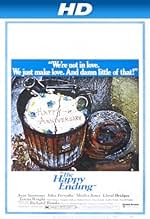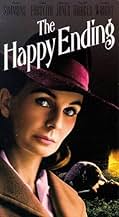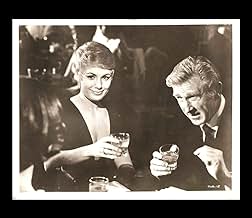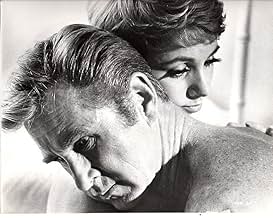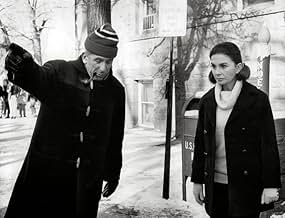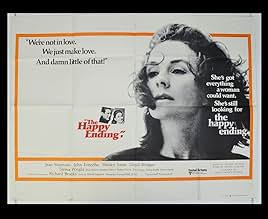PUNTUACIÓN EN IMDb
6,3/10
1,3 mil
TU PUNTUACIÓN
Una mujer de mediana edad abandona a su marido y a su familia en un intento desesperado por encontrarse a sí misma.Una mujer de mediana edad abandona a su marido y a su familia en un intento desesperado por encontrarse a sí misma.Una mujer de mediana edad abandona a su marido y a su familia en un intento desesperado por encontrarse a sí misma.
- Nominado para 2 premios Óscar
- 5 nominaciones en total
Bobby Darin
- Franco
- (as Robert Darin)
William O'Connell
- Minister
- (as Wm. O'Connell)
Eleanor Bender
- Alice
- (sin acreditar)
Ingrid Bergman
- Self - Actress in 'Casablanca'
- (metraje de archivo)
- (sin acreditar)
Argumento
¿Sabías que...?
- CuriosidadesTeresa Wright was just 11 years older than Jean Simmons, who was playing her daughter.
- PifiasDuring the opening-credit sequence, many late-model 1960's cars are seen in flashback scenes supposedly set 15 years earlier.
- Citas
[last lines]
Mary Wilson: If... if right now we were not married, if you were free, would you marry me again ?
- Versiones alternativasThe film was originally submitted to the MPAA for an R rating. After United Artists found Richard Brooks' intended cut too depressing, the studio forced to cut the film into a "moviegoer friendly" cut that was rated M. Brooks' R-rated cut was released in other countries as intended but was not released in the United States until 2016.
- ConexionesFeatures Susan Lenox (1931)
- Banda sonoraWhat Are You Doing the Rest of Your Life?
Music by Michel Legrand
Lyrics by Alan Bergman and Marilyn Bergman
Sung by Michael Dees
Reseña destacada
I love movies that come down hard against conventional life. And the ones that feature nagging, chronically unhappy, never-satisfied married people go in my "horror" stack, along with Halloween, Videodrome, Suspiria, The Fog, etc. Watching that way of life is enough to fill anyone with ineffable dread.
When you consider that lead actress Jean Simmons and director Richard Brooks (married 1960-1977) were on their way to divorce, that just adds to the terror.
Though it echoes themes in Charlotte Perkins Gilman's The Yellow Wallpaper (1899), The Happy Ending is still seen as a proto-feminist text, which it well may be. I've long held that Jean Simmons (or at least the "Jean Simmons image") is not this quiet, polite, understated "demure beauty" that is somehow constantly breaking out of that particular mold. Ms. Simmons herself can be seen as a "proto-feminist" or strong female lead actress. She demonstrates this in Hamlet, Desiree, Young Bess, The Big Country, and certainly Elmer Gantry; one could actually make this case for many of her films available on video.
Her part in The Happy Ending is really just an expansion of these roles, only this time, the unhappy marriage is brought to the fore instead of subsumed in Hollywood/Happy ending resolve.
It's not just proto-feminist women who feel trapped by marriage; that men get cold feet and then have affairs is almost too cliché to mention or bother to put in quotes. How many movies about extramarital affairs have entertained millions? This film just happens to present the unthinkable horror of when a woman wants out of it. Good for them. 8/10, but be advised, this is coming from someone unable to resist movies about women who don't want to be married.
To this end, see it as a double feature with Baby Doll (1956), or Possession (1981), mess up your mind, a little.
When you consider that lead actress Jean Simmons and director Richard Brooks (married 1960-1977) were on their way to divorce, that just adds to the terror.
Though it echoes themes in Charlotte Perkins Gilman's The Yellow Wallpaper (1899), The Happy Ending is still seen as a proto-feminist text, which it well may be. I've long held that Jean Simmons (or at least the "Jean Simmons image") is not this quiet, polite, understated "demure beauty" that is somehow constantly breaking out of that particular mold. Ms. Simmons herself can be seen as a "proto-feminist" or strong female lead actress. She demonstrates this in Hamlet, Desiree, Young Bess, The Big Country, and certainly Elmer Gantry; one could actually make this case for many of her films available on video.
Her part in The Happy Ending is really just an expansion of these roles, only this time, the unhappy marriage is brought to the fore instead of subsumed in Hollywood/Happy ending resolve.
It's not just proto-feminist women who feel trapped by marriage; that men get cold feet and then have affairs is almost too cliché to mention or bother to put in quotes. How many movies about extramarital affairs have entertained millions? This film just happens to present the unthinkable horror of when a woman wants out of it. Good for them. 8/10, but be advised, this is coming from someone unable to resist movies about women who don't want to be married.
To this end, see it as a double feature with Baby Doll (1956), or Possession (1981), mess up your mind, a little.
- DJBlackSwan
- 28 nov 2005
- Enlace permanente
Selecciones populares
Inicia sesión para calificar y añadir a tu lista para recibir recomendaciones personalizadas
- How long is The Happy Ending?Con tecnología de Alexa
Detalles
- Fecha de lanzamiento
- País de origen
- Idioma
- Títulos en diferentes países
- The Happy Ending
- Localizaciones del rodaje
- Empresa productora
- Ver más compañías en los créditos en IMDbPro
- Duración1 hora 57 minutos
- Relación de aspecto
- 2.35 : 1
Contribuir a esta página
Sugerir un cambio o añadir el contenido que falta

Principal laguna de datos
By what name was Con los ojos cerrados (1969) officially released in India in English?
Responde

